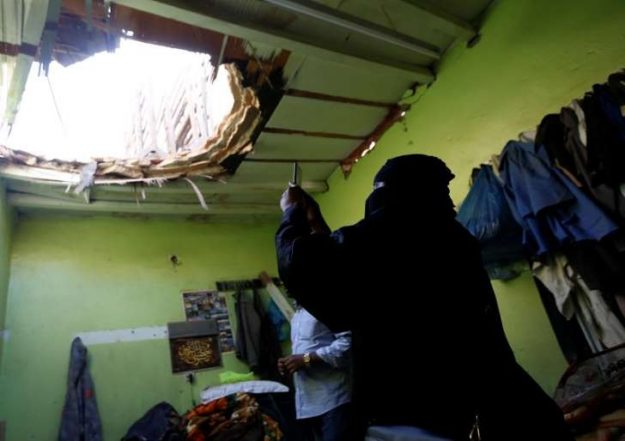
With first death in Riyadh, the Saudi-led war in Yemen hits home
–
Khattab Jalal, 27, was asleep on Sunday night in the home in eastern Riyadh that he shared with 15 other Egyptian construction workers when the sound of explosions jolted him awake.
An enormous hole had opened in the peeling green-painted ceiling of their home, which was filled with smoke and debris. He and the others ran outside, but realized that one of their housemates was not with them.
Thirty-eight-year-old Abdul Muntaleb Ali, sleeping on a thin blue mattress on the floor beside three others, had been killed when debris from a ballistic missile fired by Yemen’s Houthi militia group crashed through their roof shortly before midnight on Sunday.
With that, he became the first person to die in the Saudi capital as a result of a Saudi-led coalition’s three-year military campaign against the Houthis and their allies – a war that has already claimed at least 10,000 lives in Yemen and left around 22 million people in need of humanitarian aid.
Three of Ali’s roommates, one of whom was his brother, were wounded in the attack, Jalal told Reuters the following morning.
“For three years he didn’t leave (Saudi Arabia). He hasn’t seen his kids,” Jalal said. “You’re with your friend and you’re having dinner together – and a few hours later, you wake up and find him dead.”
Saudi forces destroyed three missiles over northeastern Riyadh late on Sunday, as well as four others fired simultaneously at the southern cities of Najran, Jizan and Khamis Mushait, the coalition said in a statement.
The attacks, which coincided with the third anniversary of the Saudi-led intervention in Yemen, marked a sharp escalation in the conflict and stripped away the sense of calm in a city that, until recent months, had never quite felt at war.
A NEW KIND OF FEAR
Haila Zayed, a 27-year-old Saudi, clutched her infant son in a panic when she heard the explosions overhead. She could feel the car shaking as her husband drove.
“I always enjoyed the safety and security in my country. For the first time I felt the kind of fear that people have at war,” she said. “May God protect our country and keep it safe.”
For its part, the Saudi-led coalition has carried out thousands of air strikes in Yemen since launching operations after the Houthis, allied with Iran, seized the capital Sanaa and forced President Abd Rabbu Mansour al-Hadi to flee.
Discussion of Sunday’s missile attack flooded Twitter on Monday, with pleas to keep Saudi Arabia secure and condolences for Ali topping the list of trending hashtags in the kingdom.
Many prominent Saudis, including newspaper columnists, clerics and members of the advisory Shura Council, urged people not to share videos and photos of the attacks, saying they would feed into Houthi propaganda.
In malls, cafes and supermarkets around Riyadh, Saudis digested the escalation in their own ways.
For Abdulrahman al-Sari, who lives in Riyadh but hails from the frequently targeted southern province of Najran, the situation was too familiar to faze him. “For me it was normal,” he said with a shrug. “We’re used to it.”
Others emerged from the experience chastened and defiant.
“I want to pick up a gun, put on a uniform and go join the brave Saudi soldiers stationed on the border,” said Fahad Matar al-Shelahy, a student at a technical college in Riyadh.
“If they give orders for people to join the soldiers, I will be the first. We all wish to be martyrs defending our country.”






